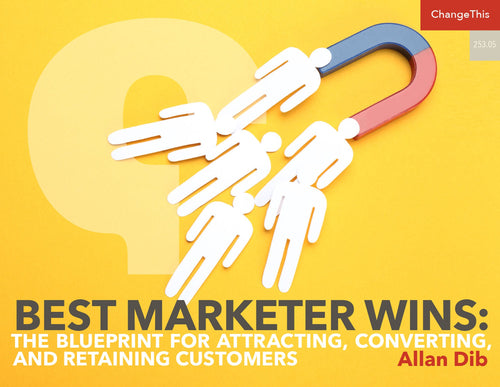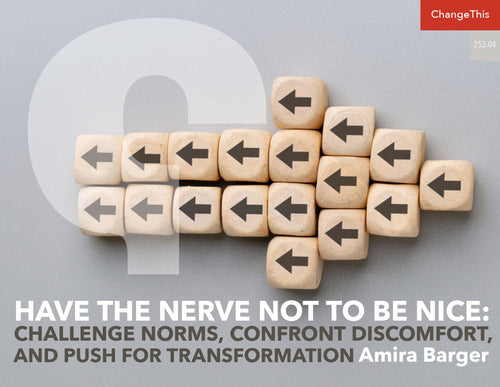Why You Should Hire a Futurist
"From the world’s largest corporations to the smallest start-ups, businesses today are partnering with futurists and visionaries in a way they never have. And that’s because the future is speeding toward them at a rate it never has."
A quiet revolution is underway.
It is as unanticipated and stealth as the internet and social media once were and just as ubiquitous. Every day our knowledge about the future grows more precise, and this is transforming how modern leaders lead.
The organism—and organization—with the greatest foresight that has the upper hand in any situation.
Foresight allows us to make plans, avert danger, get the jump ahead of others. Foresight commands us to fashion the spear before the attack, sell a stock before it tumbles, cut a cancer before it spreads. Foresight is the precursor to opportunity, the warning before the storm, the salvation before the sin.
There can be no greater advantage than certainty of the future.
Recent breakthroughs in technology—such as the proliferation of predictive analytics, Big Data, and sensor and satellite technologies—have made it possible to anticipate future outcomes with unprecedented accuracy. With every passing moment our forecasts grow more robust, more consequential, more intrusive. That’s because foreknowledge has turned previous notions about adaptation on its head. We are no longer adapting to changes in the environment. We stand on the cusp of changing the environment to which we must adapt.
And by environment, I mean every environment: physical, economic, political, social… every aspect of human life is affected by our ability to foretell future consequences—and the growing burden to avert antagonistic events before they occur.
Darwin’s world is no more. Even a stalwart theory like evolution must yield to changing circumstance. And while it may seem sacrilegious for a sociobiologist to claim science and technology have brought humankind to the brink of transcending laws that have governed life for billions of years, the truth has no obligation to conform with previous precedent. The world has changed. Humans have changed it. And we must now come to terms with the deeper meaning of that change.
Think about it. A few decades ago we didn’t know if a person was predisposed to Alzheimer’s, baldness or lung cancer, when a country’s currency was on the verge of collapse, or how close a rogue nation on the other side of the world was to a viable nuclear warhead. We didn’t know which automobile parts were likely to fail first, second and third, or when a hurricane would make landfall, or whether our credit was sufficient to secure a mortgage. But today, we do.
We have more data about future outcomes than ever before, and this has armed leaders with a heretofore unprecedented power: the ability to adapt before-the-fact. That’s right. Today’s successful companies are no longer adapting to changes in the environment, they are changing the environment to which they must adapt. They are predapting.
When Walmart discovered hot weather caused cows to produce less milk, they began monitoring the National Oceanic and Atmospheric Administration’s weather data to lock in prices in advance of shortages. Imagine their advantage as competitors scrambled to raise prices in real time as supplies declined. Similarly, when financial models revealed the devastating impact Greece’s debt crisis would have on other Euro nations, the International Monetary Fund, Eurogroup and European Central Bank averted disaster by intervening with a series of bail-out loans. And once Burt Rutan succeeded in launching an re-useable shuttle into suborbital space, Bezos, Branson, Allen and Musk wasted no time investing in commercial rocketships to deliver space cargo.
The fact is, big data, predictive analytics, computer-aided engineering, design and manufacturing, mobile communications, satellite imagery, and other technologies have brought humankind to the edge of prescience—empowering executives with the ability to sidestep failure, preempt danger, and seize new opportunities.
Which explains why the largest corporations and governments in the world have begun tapping “futurists.”
In the Eighties and Nineties technology was exploding on all fronts and leadership was on the run. So corporate recruiters went on the hunt for IT infrastructure gurus. They couldn’t find and hire them fast enough. By the turn of the Century that focus shifted to “social responsibility.” From energy conservation and green packaging, to company-wide volunteer programs, the definition of leadership expanded to include more than just the bottom line. A decade later social media came on the scene and titles like “Vice President of Consumer Insights” began popping up everywhere. Business became obsessed with monitoring consumer’s every preference and action, assuming that somehow, some way, they could adjust at the speed of Twitter. So leaders went to work building corporate cultures and systems that were more agile, responsive, and customized.
Then in 2012, Google announced that controversial futurist, and author of The Singularity is Near, Ray Kurzweil, would be joining their executive team, and we entered a new era. The era of the futurist. If it was impossible to keep up with change, then businsesses only hope was to get out in front of it. This meant inviting interesting characters like Kurzweil to work side by side with corporate bean counters, lawyers, engineers and operations folks. Long considered eccentric outliers, futurists like Kurzweil, Kaku, Canton—even prominent science fiction writers—suddenly found themselves in demand. Where was technology, business, and society headed? What would we need when we got there? How much time do we have? Was it feasible to get started now? Overnight the focus shifted from what is happening this moment on Twitter, to what can be definitively ascertained about the future. After all, knowing what a person purchased a minute ago is not nearly as useful as knowing what they plan to purchase next. In one case you’re late to the party. In the other you’re throwing it.
From the world’s largest corporations to the smallest start-ups, businesses today are partnering with futurists and visionaries in a way they never have. And that’s because the future is speeding toward them at a rate it never has.
That said, the advantages of foresight are not limited to getting the jump on opportunity alone. Foreknowledge has also led to much safer products. There’s no argument as to whether toasters, utility plants and automobiles are safer today than at any other time in history. Medical devices, children’s toys and the furnace in your home are also safer, more reliable and longer-lasting. Thanks to CAD systems which allow engineers to build multi-dimensional models and analyze flaws in advance of finalizing their design, weaknesses and dangers can now be eliminated beforehand. In many cases the practice of building and testing physical prototypes has been completely abandoned. As well as “over building” to safeguard against potential problems. And our ability to nail down future costs, manufacturing capacities, inventory and service requirements, staffing, etc. has become so precise it has eliminated much of the previous guesswork.
Which also means that the risk previously associated with making future investments has also declined.
As leaders move away from imprecise exercises such as trend analysis, forecasting and risk assessment, toward algorithms which pinpoint future outcomes with absolute certainty, their need to adopt the skills and practices of futurists grows ever more paramount. The very fact that Google made a place in their corporate hierarchy for Kurzweil—an individual who proclaims all diseases will be eliminated in our lifetime, humans will become machines, and who, by his own calculations has made 127 our of 147 correct predictions about the future during the past decade—is a clear sign of where business, government and society is headed.
While there may have been plenty of good reasons for Google to grab Kurzweil, you might wonder what was in it for Kurzweil. Not long ago I had an opportunity to ask him why an acclaimed futurist—with means and freedom—would accept Google’s offer. True to form Kurzweil had good reason, “They have more resources—so I could do more and move faster. So long as they were going to let me work and leave me alone, why not take advantage of the resources?” Makes perfect sense. To this point futurists have been largely marginalized and thus, confined to the scant resources of universities and private benefactors. Fact is, had Kurweil not invented a computer program which matched high school students to the right colleges and sold that invention—had he not started Kuzweil Computer Products and developed the first omin-font optical character recognition system along with other forward- looking technologies—we might not ever have heard of Ray Kurzweil. At an early age, he used his insights to capitalize on the future in a way that allowed him to escape the limited resources of academia. So Google’s offer to fund Kurzweil was good for both. And in the short time he’s been with Google, Kurzweil has made his mark. His first initiative was to make Google’s search engine technology obsolete.
According to Kurzweil the next big thing would be personal, virtual assistants that understand natural language. Only a futurist would have the confidence to tell a company the products and services on which they were built and made billions, is obsolete. This is another reason why companies need futurists.
While I don’t consider myself a futurist per se, I research and write books about the future and how to successfully adapt to change. And during this past year I have received more invitations to join the boards and executive management teams than I have over my entire career—proving that the world’s most successful companies are undergoing a profound an epiphany: they’re discovering that the greatest competitive advantage is not market share, or the best price/performance, or consumer insights, or a better than expected return to investors.
It’s not brand awareness and loyalty, or personalization, or social responsibility, or an agile corporate culture. There can be no greater advantage than certainty of the future. Not in nature. Not in business. Not in governance. If you’re an organization that isn’t leveraging predictive analytics and doesn’t have a futurist on board, get going.
The future won’t wait. Fact is, it’s already here.
About the Author
Rebecca D. Costa is an American sociobiologist, author, and host of the syndicated radio program The Costa Report. She is a leading expert on “fast adaptation” in complex environments, and a recipient of the prestigious Edward O. Wilson Biodiversity Technology Award. Costa was the founder and CEO of one of the largest technology marketing firms in California, where she developed an extensive track record of introducing disruptive technologies. Her clients included industry giants such as Hewlett-Packard, Apple, Oracle, Siebel Systems, 3M, and General Electric. Retiring at the zenith of her career in Silicon Valley, Costa spent six years researching and writing the international bestseller The Watchman’s Rattle: A Radical New Theory of Collapse. Owing to the growing need to respond more quickly to change, Costa is also a popular international speaker, currently represented by the American Program Bureau. Costa's latest book in On the Verge. For more information, visit www.rebeccacosta.com.












































